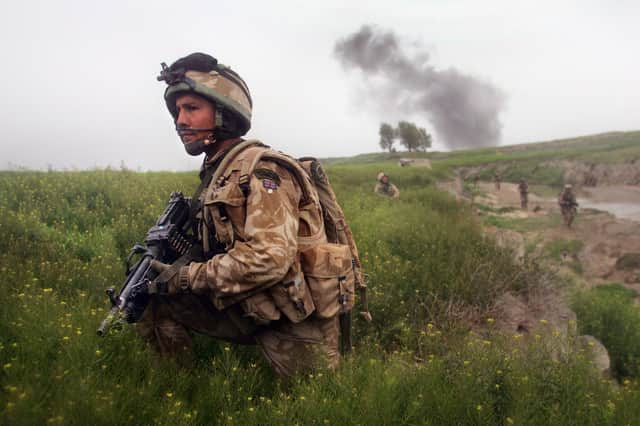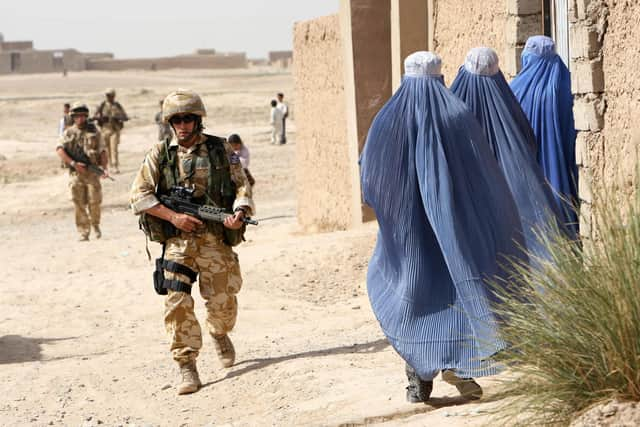Afghanistan fell to Taliban because West underestimated its enemy and lacked commitment – Stuart Crawford


None of them ended satisfactorily. At the end of the Third Anglo-Afghan War in 1919, Afghanistan was independent, the British withdrew, and the Afghans entered a period of special relationship with Soviet Russia.
Eventually that relationship soured too, leading to the Soviet invasion in 1979. The Russians left ten years later with their tails between their legs having suffered 15,000 dead. Not for nothing is Afghanistan known as the graveyard of foreign armies.
Advertisement
Hide AdAdvertisement
Hide AdAnd now we are witnessing the end of yet another military adventure, this time the US-led Nato invasion in the aftermath of the 9/11 attacks on New York and Washington. What sets this newest withdrawal apart from the others, however, is the speed at which the Afghan government has collapsed.
Why should this be so? After all, the western powers entered Afghanistan in 2001 and drove the Taliban from power thereby denying al-Qaeda a safe base of operations there. It only took three months, with many Taliban and al-Qaeda operatives fleeing across the border into Pakistan.
Over the next 20 years, the US and its allies poured billions of dollars into military operations to counter a resurgent Taliban and into reconstruction and civil aid projects. When the main fighting died down in 2014, the Americans had lost roughly 2,500 servicemen and women, the UK around 450, plus many other casualties from allied militaries. Estimated losses for the Afghan security forces are approximately 69,000.
Thousands of words have already been written on why it all went so wrong, but here is my take on matters. First and foremost, the West was naïve in assuming that the Afghan people would welcome a western-style liberal democracy.


I have lived in the USA and there is a deeply ingrained view there that poorer and less developed countries aspire to be American. This, in my opinion, is based on a skewed set of ethnocentric materialistic values and is manifestly and obviously wrong. They didn’t necessarily want what we thought they did.
Next, we made the unforgivable sin – in military circles – of underestimating the enemy. After the rapid successes against the Taliban in 2001, it was all too easy to dismiss them as “a bunch of blokes in open-toes sandals on motorbikes”, but they were and are good at what they do.
Above all we underestimated their resilience and staying power. To paraphrase another conversation, they may never have beaten us on the battlefield but that’s totally irrelevant. They are still there and we are leaving.
Also, what we probably didn’t understand or chose to ignore is the long-established Afghan practice of negotiated arrangements between opposing forces in conflict, whereby there are agreements not to attack or interfere with your enemy.
Advertisement
Hide AdAdvertisement
Hide AdThis is supported by a network of tribal and kinship ties which sometimes saw members of the same family supplying soldiers to both sides. This to some extent guaranteed some element of safety and amnesty for the vanquished.
Part of the reason, therefore, that the Afghan government forces have collapsed so quickly – after, it has to be said, fighting hard for many years with us in support – is that such arrangements have been in place for many years.
Corruption, lack of resources, and poor leadership added to the mix, and many Afghans must have wondered exactly what they were fighting for. The Taliban, on the other hand, knew exactly what they were fighting for and sought to achieve.
Finally, it was an overall tale of too few resources committed too late by the West. After the initial invasion in 2001, little attention was paid to nation building for the next five years. When focus was shifted to it, the horse had already bolted. We were always playing catch up from then on in.
It also has to be said that, despite the impressive numbers of troops deployed during the height of the military campaign, they were always too few for the task in hand. Some pretty poor tactical decisions were taken on the ground, not least by the British army in Helmand.
When British troops were allocated Helmand in 2006, their intended role was to provide safety and security for various reconstruction projects. But their arrival there provoked a furious reaction from a reconstituted Taliban. Our soldiers found themselves in very different circumstances to what they expected.
To compound the difficulties, only 9,700 troops were expected to secure an area of over 58,500 square kilometres containing over 1,000 villages and settlements with a population of over 1.5 million inhabitants. It was a hopeless task, doomed to failure from them outset.
For reasons never properly explained, the decision was taken to spread British troops across 137 bases and checkpoints, dispersing forces and literally making them hostage to fortune as the Taliban were attracted to attack these small, isolated outposts as bees are to honey.
Advertisement
Hide AdAdvertisement
Hide AdAfter much bravery and heroism against a more numerous foe, and despite the advantages of superior technology and air power, the British army had to be rescued by the Americans. This military defeat, added to the similar debacle in Basra in Iraq, did much to tarnish the British army’s hard-won reputation.
The biggest takeaway from the whole Afghan affair, however, is that potential future adversaries now know how to defeat the USA.
The US military’s Achilles’ Heel has always been domestic public opinion. Once it loses the support of electorate it is finished, as in Vietnam, as in Afghanistan. All you have to do is outlast them.
Stuart Crawford is a former Lieutenant Colonel in the Royal Tank Regiment
A message from the Editor:
Thank you for reading this article. We're more reliant on your support than ever as the shift in consumer habits brought about by coronavirus impacts our advertisers.
If you haven't already, please consider supporting our trusted, fact-checked journalism by taking out a digital subscription.
Comments
Want to join the conversation? Please or to comment on this article.
